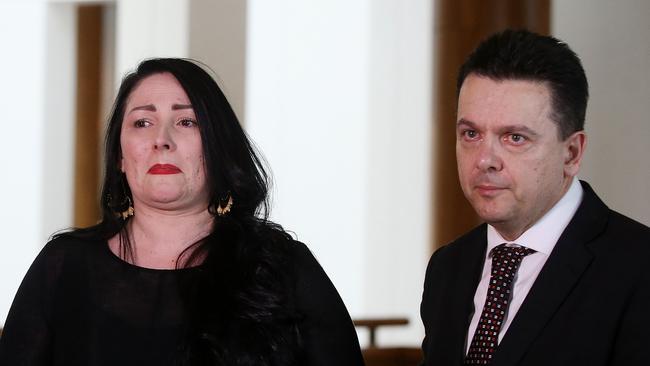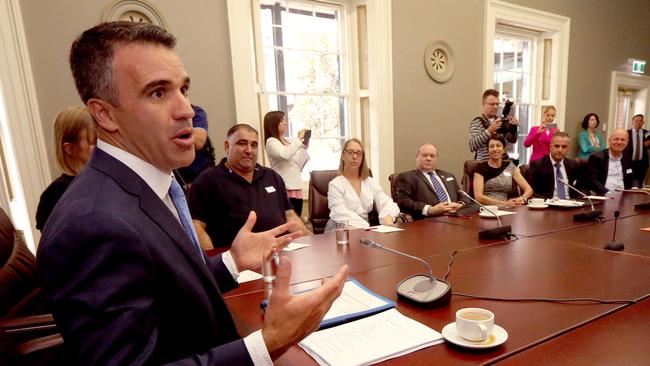SA Best puts forward new 10-point law and order charter focusing on victims
SA Best leader Nick Xenophon has put forward his law and order plan — which, if passed, would ensure South Australian victims of crime have the strongest rights in the nation.
SA 2018
Don't miss out on the headlines from SA 2018. Followed categories will be added to My News.
- Election HQ: See the latest news, analysis, videos and data maps
- Victims’ group calls for toughened murder laws
SA Best leader Nick Xenophon has put forward his law and order plan — which, if passed, would ensure South Australian victims of crime have the strongest rights in the nation.
The plan would be negotiated with the new government if SA Best wins the balance of power in the Upper House.
The 10-point law and order charter includes:
■ Giving victims the right to be part of any plea bargain deal by prosecutors.
■ Establishing a legal aid system for victims to enable them to have representation in court.
■ An audit of victim support services.
■ An additional $1 million in funding for the Commissioner For Victims Rights office to provide legal aid for victims at coronial inquests and judicial inquiries.
The charter will also see the mental impairment defence under Section 269A of the Criminal Law Consolidation Act reviewed to ensure the defence of being drunk or under the influence of drugs cannot be used.

Mr Xenophon said action could be taken within the first 100 days of the new parliament to implement the measures.
“For too long victims of crime have been ignored, or just given lip service to their rights and concerns that they are to be treated fairly,” he said.
“Too often victims are revictimized by the criminal justice system.”
“The eminent UK jurist Lord Steyn summed up the imperative when he said in a 2001 House of Lords case: ‘There must be fairness to all sides. In a criminal case this requires the courts to consider a triangulation of interests. It involves taking into account the position of the accused, the victim and his or her family and the public’.”
THE SA BEST LAW AND ORDER PLAN
■ Establishing an enforceable Victims of Crime Charter placing an obligation on police and prosecutorial authorities to fully inform victims of their rights and recognising them as genuine participants in the criminal justice system.
■ Criminal matters can no longer proceed unless the court is satisfied that firstly, the victim has been consulted in any plea bargain, and that victims have the right to legal representation for advocacy, and secondly, during sentencing that the victim is given the opportunity to provide a Victim Impact Statement.
■ A legal aid system is to be established for victims to be funded for advocacy and legal representation — consistent with the UN guidelines for legal aid and in matters involving death or serious injury the victim’s family or the victim will have the right of legal representation at the bar table at trials — similar to a highly successful system operating in Sweden.
■ Grossly underfunded victim support services are to be subject to an immediate audit to ensure victims get the support they need, and to establish a new support service for victims of online abuse and scams.
■ Alleged perpetrators in offences involving acts of violence must be drug and alcohol tested, and the statistics made available on a quarterly basis specifying the type of offence and the type of drug found in the alleged perpetrator.
■ Reviewing the mental impairment defence under 269A of the Criminal Consolidation Act so that the defence cannot be used by those who say they are under the influence of drugs, such as ice.
■ Victims should have the right to legal representation at pre-trial hearings in the Magistrates court.
■ Increase the budget of the Commissioner for Victims Rights by at least $1 million per year to ensure that they can fund victims to have legal representation at coronial inquests and at judicial inquiries/Royal Commissions.
■ The introduction of sentencing guidelines, with the establishment of a Sentencing Guidelines Council to include representative voices from victims of crime. While not in the category of mandatory sentencing, it will include a requirement for the courts to explain why a sentencing guideline has not been followed.
■ An annual reporting requirement to the Parliament through the Commissioner for Victims Rights as to the outcomes contained in the reform measures so there is greater transparency in the criminal justice system.


